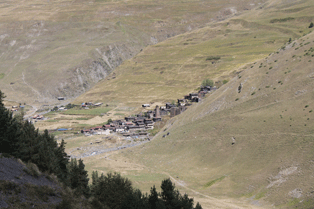Giorgi Ioramashvili
Tusheti was named as one of the most promising resortsin Georgia last year. In the Yahoo travel and BBC top ten ratings, Tusheti took fifth place. It is one of the most beautiful regions but the roads are very bad and dangerous, not to mention that it has one of the highest road passes above sea level in Georgia. In the winter this region is almost empty.
Tusheti is located in eastern Georgia, in the mountainous region of Khaketi and is under the administration of Akhmeta district municipality. On the north side it is bordered by Chechnya and on the east, by Dagestan. Tusheti is a protected area with beautiful nature and architecture which attracts many Georgian and foreign tourists. It is the largest protected area in Europe.
Due to climate problems, the area is closed from winter to spring. So in the winter the area is almost empty. Visiting Tusheti is possible only in summer and with an off-road vehicle. People from Tusheti traditionally look after cattle and sheep. In recent years many tourists visited this area, which created new sources of income for residents, who are beginning to develop tourist services and hotels.
There is new life in the villages. Due to help from International donor organizations and the government tourism department, houses that were empty or in disrepair have been renovated and new houses have been built. In most of the repaired houses, guest houses have been opened for Georgian and foreign tourists.
Restoration of the cultural monuments of Dartalo and Kvavlo is being carried out by the National Agency for Cultural Heritage.
When you are in Tusheti, you will notice that there are fewer Georgian tourists than foreigners. Unlike in other parts of Georgia, here there is no pre-election agitation. People in Tusheti pay less attention to government promises and they have fewer expectations about promises being fulfilled or not.
If the access road is damaged, we pay for it with money from our pockets, we hire a tractor and repair it by ourselves. We have little hope about help from the government”-says Arkadi Bakhturidze, resident of Ilurta village, who never forgets to visit the traditional worship places in Tusheti. Tsovata valley, in one part of Tusheti, is in poor condition. There is no restoration going on and people don't seem to visit here. Shepherds are the only people you can meet here in the summer.
From Girevi village, the last village on the other side of the valley (where the vehicle road leads after registration with the border guards), you can walk across Atsuneti pass to the other side of Khevsureti (Mutso and Shatili). You can hire a guide and horses too. After travelling for 2-3 days trough Atsuneti pass you will get to another mountainous place of Khevsureti.
Here there is less comfort for tourists compared to Tusheti. Hotels are rarer and if you intend to continue on the road it will be difficult to find food, because there is only one small shop on the way, where you won’t even be able to find bread. Also it is noticeable that there is more garbage here than in Tusheti. This can be explained by the presence of Georgian visitors. Foreigners never throw garbage on the road. The bus comes here twice a week and if you haven’t arranged in advance for the driver to pick you up, you may find yourself staying in Tusheti. .
Opposition parties have less specific programs about how to develop this region. But some political parties support the establishment of a preferential tax system for those who live in mountainous areas. The ruling party mostly plans to develop tourism and isn’t trying to solve the social problems of people, who have to solve their own problems with the money income obtained from tourists.




